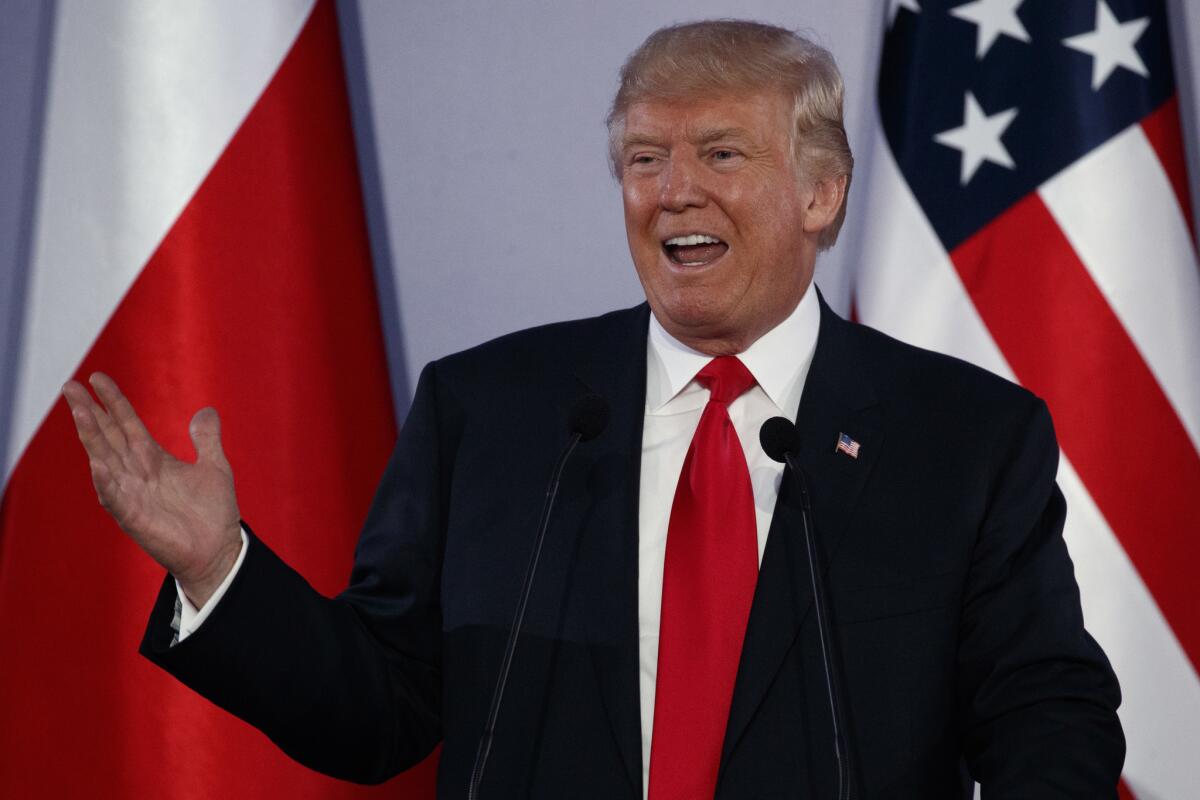Editorial: The more we know about Trump’s Ukraine ‘favor’ request, the more impeachable it looks

- Share via
When President Trump announced that he would release the “complete, fully declassified and unredacted transcript” of his July 25 telephone conversation with Ukraine’s president, he said it would buttress his claim that the conversation was proper, indeed “absolutely perfect.” The White House on Wednesday released a written record of the call between Trump and President Volodymyr Zelensky, and it was anything but exoneration.
The document — a “memorandum” that the White House notes is not a verbatim transcript — is damning. It clearly demonstrates that Trump asked Zelensky to investigate former Vice President Joe Biden, a potential Democratic opponent for Trump in 2020, and Biden’s son Hunter, who served on the board of a Ukrainian energy company at the time his father was vice president. And while Trump doesn’t promise to reward Ukraine for such an investigation, the conversation took place at a time when hundreds of millions in U.S. military aid for Ukraine was being held up. It would have been easy for Zelensky to perceive an implied quid pro quo: Help me discredit a political opponent and you’ll get your aid.
Trump’s comments about Biden in the conversation are a legitimate subject for the House to investigate as part of the “official impeachment inquiry” House Speaker Nancy Pelosi (D-San Francisco) announced on Tuesday. But investigators shouldn’t focus on just one telephone conversation. They need to determine whether Trump or individuals in his orbit took other steps to induce Ukraine to dig up dirt on Biden.
Granted, the telephone conversation is plenty disturbing in itself. Alluding to a right-wing conspiracy theory that the elder Biden pressed for the removal of a prosecutor in Ukraine widely viewed as soft on corruption in order to protect Hunter Biden’s company, Trump told Zelensky: “There’s a lot of talk about Biden’s son, that Biden stopped the prosecution and a lot of people want to find out about that so whatever you can do with the attorney general would be great. Biden went around bragging that he stopped the prosecution so if you can look into it.”
It’s worth pointing out here that not only was Biden carrying out official U.S. government policy in seeking the prosecutor’s ouster — an ouster also sought by several European allies — but Bloomberg News reports that the prosecutor appears to have ended his investigation of the energy company that employed his son a year before Biden made the demand.
The Justice Department said Wednesday that Atty. Gen. William Barr didn’t have any contact with Ukrainian officials about the president’s request for an investigation of Biden. But Trump also urged Zelensky repeatedly to speak with Rudolph W. Giuliani, Trump’s personal lawyer and excitable apologist on television, who has pushed for an investigation by Ukraine of the discredited allegations against the Bidens. Bizarrely, in the telephone call Trump refers to Giuliani — “a highly respected man” — as if he were a government official. The Washington Post reported Tuesday that some administration officials were upset about what they say was Giuliani inserting himself in U.S. policy toward Ukraine.
Trump also sought help from Zelensky in his quest to bolster a second bizarre conspiracy theory, which seeks to undermine the evidence that Russians sought to help Trump’s presidential campaign by hacking into the Democratic National Committee’s server. Except the supposedly Ukrainian company Trump cited, Crowdstrike, is an American one, led by a naturalized American citizen who emigrated from the Soviet Union, and its findings were backed up by special counsel Robert S. Mueller III’s investigation.
In a meeting with Zelensky at the United Nations on Wednesday, Trump insisted that he exerted “no pressure” on Zelensky in their telephone conversation. The Ukrainian president agreed “that nobody pushed me,” which is what one would expect someone in his position to say.
Trump also engaged in some whataboutism by suggesting that Democrats had been guilty of what he was accused of: pressuring Ukraine for political purposes. In 2018 three Democratic senators did write to Ukraine’s chief prosecutor to complain that his office might not be cooperating with Mueller’s investigation into possible ties between Russia and the 2016 Trump campaign. But senators asking for cooperation with a lawful investigation is dramatically different from a president exhorting a foreign leader to investigate a political opponent. The former is routine; the latter is deplorable.
Given the multitude of allegations against Trump, including that he obstructed justice by trying to thwart Mueller’s investigation, it might seem peculiar that it was this episode that galvanized support for impeachment among House Democrats (albeit not Republicans, who generally continue to defend Trump). But what the White House’s own memorandum about the conversation reveals is serious. It’s fitting that it now take center stage.
More to Read
A cure for the common opinion
Get thought-provoking perspectives with our weekly newsletter.
You may occasionally receive promotional content from the Los Angeles Times.










